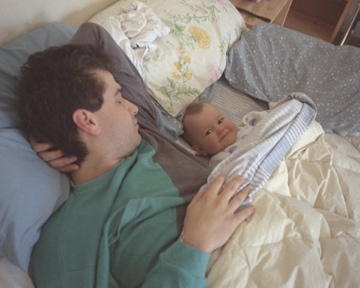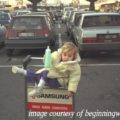One of my newsletter readers asked for child-raising advice. Well, that’s putting it a bit strongly, but, apropos of my own daughter, she asked: “…what do you think contributed to her self-confidence and caring for others?” …and I felt an article coming on.
Not that I have definitive answers, or simple ones. I have wondered myself how Ross got to be who she is. Leaving aside occasional bouts of teenage angst, at 17 Ross has all of the self-confidence that I have at 44 (and then some). By the time she’s 30, she’ll be terrifying! There are doubtless many factors: the genetics of her parents and the way we are raising her, but also the culture(s) she’s growing up in.
No one really knows why kids turn out the way they do (though there are lots of theories), nor how much influence parents really have, nor how much of that influence is genetic, and how much is environmental.
We had an object lesson in nature vs. nurture during our wedding – the first time since my brother’s babyhood that many people had seen him and my dad together. (Quick history: My parents divorced when I was 9 and my brother was 1; Ian remained in Thailand with my mom, who remarried; I went to the US with my dad. I then did not see my mom for eight years, Ian did not see Dad for even longer.)
Everyone was astonished at how much Dad and Ian resembled each other. Not just in the obviously genetic stuff like height, build, face, etc., but also in things you wouldn’t think are genetic: voice and manner of speaking, yes, but even use of idiom! It seemed clear that sheer genes have a lot to do with how kids turn out, in both large and subtle behaviors, regardless of how and by whom they are raised.
A few months later, Rossella was born.
During the last months of my pregnancy, I once dreamt that I was working in a lab where I was supposed to take care of white mice. In the course of moving a dozen of these mice from one cage to another, I managed to kill them all: one fell on the floor and I stepped on it, one drowned in its water dish, etc. I woke, sweating, and thought: “I have some anxieties about becoming a mother.”
I hadn’t been around kids or babies much since the separation from my brother. I was de facto an only child (again) after that, and in boarding school you spend most of your time with your peers, seeing relatively little of people in other age groups, and you don’t have opportunities to babysit. I had never taken care of an infant, changed a diaper, or any of that, nor did I have a mother I could turn to for advice. So I thought I had reason to be anxious about my mothering skills.
I don’t recall actually talking about this to anyone, though I silently resented the idea that some sort of mystical “mothering instinct” was supposed to automatically kick in as soon as the baby was born – what if it didn’t? Would that make me a bad person? A failed mother?
Rossella was born, after 24 hours’ labor, around 5 pm on a rainy night in August. Enrico was a champion: he stood by my side throughout the labor, massaging my back and being encouraging even when I was yelling a lot, and he didn’t faint at all the blood (actually, I’m not sure he even noticed it, he was so deliriously happy to have his daughter in his arms).
But, the way most hospitals work, the father goes home after labor, and you, the brand new mother, find yourself alone with this stranger who just came out of your belly.
I had my “special” new mother hospital dinner (it was awful) while the nurses kept my baby in a bassinet in the nursery – I didn’t have a private room, so she had to be in the nursery, but I could go get her whenever I wanted.
I had slept unusually well (for me) during the last trimester of pregnancy. I have rarely slept so well since. That first night, in spite of being thoroughly wrung out by hard labor, I woke up at least once and went to the nursery to check on my daughter. And panicked: she wasn’t in her assigned bassinet. I was about to have a hysterical fit when the nurses explained that they had put her in an incubator to quieten her because she was fussy. They had also tried giving her a pacifier. She spit it out. Good girl.
I was irritated that they had even tried: I had told them I wanted to breastfeed, and, to ensure a smooth start (as recommended by the La Leche instructor), no bottles or pacifiers should be given. Ross preferred real breast right from the start, and would never take a pacifier even later on, when we half-wished she might.
As I emerged from the haze of post-natal exhaustion and began to take charge of my own child, I realized that dealing with a baby was primarily a communications problem: here was an individual who undoubtedly had needs and desires, but wasn’t very good at articulating them. But we were two intelligent, willing people: between us, we’d figure it out.
Of course I’d read books – good ol’ Dr. Spock, for starters – but I was doubtful about much of the advice I read. Try to make the baby sleep according to a schedule? Let it cry itself out if it doesn’t? That sounded like a recipe for no sleep for anybody (including our apartment neighbors). My dad had told me that, during my infancy, he was unable to bear my crying, so he was the one who would get up at 2 am to give me a bottle.
Enrico’s parents had come to stay with us two weeks before the birth, and left again two weeks afterwards. Their timing was perfect and their support wonderful – I didn’t have to cook or shop while I was coping with figuring out this new person in my life. Unlike many Italian in-laws (or so I’m told), they also maintained a strict policy of non-interference: neither ever tried to tell us how to do anything with our baby (unless we asked).
I suppose Dr. Spock would say we were overly permissive parents. We never really tried to force Ross onto a schedule. When she cried, we picked her up, and if she wanted to feed, she fed. If she didn’t, we did whatever we could to entertain her or try to get her back to sleep, til we were bleary-eyed ourselves. We wished someone woud invent a mechanism that would have the same effect as a moving car – which always put her right to sleep – so that we could sleep at the same time.
All the books say you’re not supposed to keep the baby in bed with you, in case you might roll over and smother it. This seemed over-fearful to me: I was so alert to Ross’ tiniest squeak that there was no chance I could sleep through smothering her. As often as not, we’d all fall asleep in the bed together after a night feeding. And Ross often woke up first.
Perhaps Ross’ self-confidence has less to do with anything particular we did for/to/with her than with what we didn’t do.
Mainly, we didn’t try to stop her doing anything she wanted to try. But we were always there, unobtrusively hovering, to make sure she didn’t get hurt.
Ross didn’t start walking til 15 months, so on her first birthday, which we spent at the beach with Enrico’s parents, she was still crawling. This didn’t slow her down much. She would crawl straight down the beach into the (very shallow) water, and keep going until the tiny waves lapped her face. And she would laugh, even as bystanders gasped in horror: “Signora! La bambina!” (“Lady! Your baby!”) – apparently they thought I was going to let her drown, though I was standing right over her and could scoop her up as soon as she got too deep.
Ross was never afraid of the water, even when she got completely dunked by a slightly more vigorous wave.
However, at that same beach, I saw a good illustration of what not to do. A mother accompanied her toddler into the water. The little girl strode fearlessly out, clearly enjoying the sensations, til she got to chin depth. Then a little wave broke in her face and she paused, shocked. Her face screwed up in that classic moment of childish indecision: “Is this a big deal? Should I be upset about it?”
Her mother made up her mind for her: she swooped down, scolding: “See! I told you what would happen!”
The child burst into tears and screams. She had gotten her mother’s message: she was supposed to be afraid. I wouldn’t be surprised if that girl stayed afraid of water for years afterwards.



